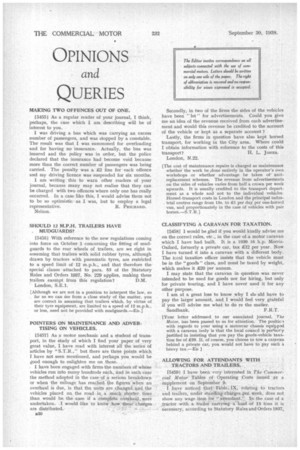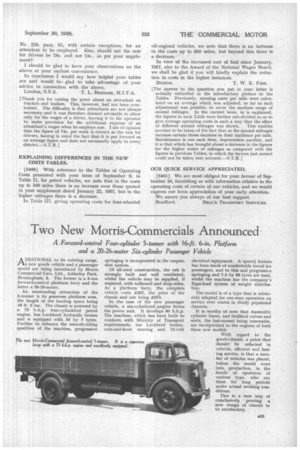OPINIONS
Page 44

Page 45

If you've noticed an error in this article please click here to report it so we can fix it.
and
QUERIES
MAKING TWO OFFENCES OUT OF ONE.
[5455] As a regular reader of your journal, I think, perhaps, the case which I am describing will be of interest to you.
I was driving a bus which was carrying an excess number of passengers, and was stopped by a constable. The result was that I was summoned for overloading and for having no insurance. Actually, the bus was insured and the policy was in order, but the police declared that the insurance had become void because more than the correct number of passengers was being carried. The penalty was a £2 fine for each offence and my driving licence was suspended for six months.
I am writing this to warn other readers of your journal, because many may not realize that they can be charged with two offences where only one has really occurred. In a case like this, I would advise them not to be so optimisticas I was, but to employ a legal
representative. R. PRICHARD. Nelion.
SHOULD 12 M.P.H. TRAILERS HAVE MUDGUARDS?
154561 With reference to the new regulations coming into force on October 1 concerning the fitting of mudguards to the rear wheels of trailers, are we right in assuming that trailers with solid rubber tyres, although drawn by tractors with pneumatic tyres, are restricted to a speed limit of 12 m.p.h., and that therefore the special clause attached to para. 53 of the Statutory Rules and Orders 1937, No. 229 applies, making these trailers exempt from this regulation? D.M. London, S.E.1.
[Although we are not in a position to interpret the law, so far as we can See from a close study of the matter, you are correct in assuming that trailers which, by virtue of their tyre equipment, are limited to a speed of 12 m.p.h., or less, need not be provided with mudguards.—ED.] POINTERS ON MAINTENANCE AND ADVERTISING ON VEHICLES.
[54571 As a motor mechanic and a student of transport, in the study of which I find your paper of very great value, I have read with interest all the series of articles by " S.T.R.," but there are three points which
have not seen mentioned, and perhaps you would be good enough to enlighten me on these.
I have been engaged with firms the numbers of whose vehicles run into many hundreds each, and in each case the method adopted in the case of _a serious breakdown or when the mileage has reached the figures when an overhaul is due, is that the units are changed. and the vehicles placed on the road. in a much shorter time than would be the -case if a eorrip_leto overhaul_ were undertaken. .I would like to knce.i how these charges are distributed.
BO Secondly, in two of the firms the sides of the vehicles have been "let" for advertisements. Could you give me an idea of the revenue received from each advertisement and would this revenue be credited to the account of the vehicle or kept as a separate account ?
Lastly, the firms in question have also kept horsed transport, for working in the City area. Where could I obtain information with reference to the costs of this
transport? H. L. JONES. London. N.22.
[The cost of maintenance repairs is charged as maintenance whether the work be,done entirely in the operator's own workshops or whether advantage be taken of unit. replacement schemes. The revenue from advertisements on the sides of vehicles varies from half a crown per week upwards. It is usually credited to the transport department as a whole and not to the individual vehicles. Horsed-transport costs in London and the principal industrial centres range from 15s. to £1 per day per one-horsed van, and proportionately in the case of vehicles with pair horses.—S.T.R. ] CLASSIFYING A CARAVAN FOR TAXATION.
[5458] I would be _glad if you would kindly advise tne on the correct rules, etc., in the case of.a motor caravan which I have had built, It is a 1930 16 h.p. MorrisOxford, formerly a private car, tax £12 per year. Now I have turned it into a caravan with a different body. The lccal taxation officer insists that the vehicle must be in the "goods" class, and must be taxed by weight, which makes it £20 per annum.
I may state that the caravan in question was never intended to be used for goods nor for hiring, but only for private touting, and I have never used it for any other purpose.
I am at a great loss to know .why I shc uid have to pay the larger amount, and I would feel very grateful if you will advise me what to do re the matter.
• Sandbank. . F.R.T. • [Your letter addressed to our associated journal, The Motor, has been passed to us for attention. The positica with regards to your using a motorcar chassis equippad with a caravan body is that the local council is perfeet'y justified in insisting that you pay the goods-vehicle taxation fee of £20. If, of course, you choose to tow a caravan behind a private car, you would not have to pay such a heavy tax.—En ]
ALLOWING FOR ATTENDANTS WITH TRACTORS AND TRAILERS.
154591 I have been very interested in The Commercial Motor Tables of Operating Costs issued as a supplement on September 9.
I have noticed that, rattle; IX, relating to tractors and trailers, under standing charges-per week, does not show any wage item for "attendant." In the case of a tractor with a trailer Carrying a load of 14 tons it is necessary, according to Statutory Rules and Orders 1937, No. 229, para. 85, with certain exceptions, for an attendant to be employed. Also, should not the rate for drivers be 78s. and not 74s., as per your supplement?
I should be glad to have your observations on the above at your earliest convenience.
In conclusion I would say how helpful your tables are and would be glad to take advantage of your advice in connection with the above.
London, S.E.3. T. L. BRIDGER , M.I.T.A.
[Thank you for raising the point about an attendant on tractors and trailers. This, however, had not been overlooked. The difficulty is that attendants are not always necessary and it was therefore deemed advisable to allow only for the wages of a driver, leaving it to the operator to make provision for the additional expense of an attendant's wages when he employs one. I am of opinion that the figure of 74s. per week is correct as the rate for drivers, having in mind the fact that it is put forward as an average figure and does not necessarily apply in every
EXPLAINING DIFFERENCES IN THE NEW COSTS TABLES.
[5460] With reference to the Tables of Operating Costs presented with your issue of September 9, in Table II, for petrol vehicles, we note that in the costs up to 500 miles there is an increase over those quoted in your supplement dated January 22, 1937, but in the higher mileages there is a decrease.
In Table III, giving operating costs for four-wheeled
oil-engined vehicles, we note that there is an inerease in the costs up to 600 miles, but beyond this there is a decrease.
In view of the increased cost of fuel since January, 1937, also to the Award of the National Wages Board, we shall be glad if you will kindly explain the reduction in costs in the higher instances.
Buxton. T. W. E. Emil.
[The answer to the question you put in your letter is actually embodied in the introductory preface to the Tables. Previously, running costs per mile were calculated on an average which was adjusted, so far as such adjustment was possible, to cover the medium range of annual mileages. In the current Issue, as is explained, the figures in each Table were further sub-divided so as to give average operating costs in such a way that the effect
of different annual mileages was shown. This enables account to be taken of the fact that as the annual mileages increase certain items decrease in their incidence per mile. Maintenance is one such item, depreciation .another, and it is that which has brought about a decrease in the figures for the higher scales of mileages as compared with the figures in previous Tables, in which the factors just named could not be taken into account.—S.T.R.]
OUR QUICK SERVICE APPRECIATED.
[5461] We are most obliged for your favour of September 16, furnishing us with information relative to the operating costs of certain of our vehicles, and we would express our keen appreciation of your early attention.
We assure you always of our best support.
Bradford. BELL'S TRANSPORT SERVICES.




























































































